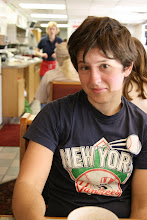 Here's something I wrote to send with submissions for the love show at the Playspace. Yeah, yeah, and some of the text is from a previous posting. Get over it.
Here's something I wrote to send with submissions for the love show at the Playspace. Yeah, yeah, and some of the text is from a previous posting. Get over it.If my mother is the feeler and my father is the thinker, they would still agree on the same thing, that "work is love made visible". This expression was made notable in the beginning of the 20th century by the spiritual leader (and some would say, prophet) Kahlil Gibran, a Syrian refugee who found his new home in New York City. In our family, love is made visible through our work. When my parents lived in Iowa City they found a piano on the side of the road. My father spent the better part of the next 6 years stripping the paint off that piano, re-varnishing it, tuning it, and insisting to this day that his children, against all our unacknowledged complaining, learn how to play it.
This idea, that work is love made visible, certainly informs the practice by which I make things. The duress and self-sacrifice of my commitment and time demonstrate love, but also feel like love too. Formally, this love is demonstrated through repetitive mark-making, through what seem like epic demonstrations of patience and will. By choosing to render an object I prove a commitment to it's investigation, to it's replication and preservation. But the drawings themselves are also about love, about the love of drawing, about the love of images to mean something greater than their existence on paper, about the stories inscribed in markmaking and the process of making those marks.
These drawings serve as stand-ins to talk about relationships with loved ones they represent who I've lost through emotional separation, geographic dislocation or death. My twenties seem, to me, like a profound era of loneliness as the expectation to be increasingly autonomous from my family and childhood community strides ahead of the formation of my own. The "work" in "work is love made visible" can refer to the demonstration of commitment to another person, but as I realize, more and more, how the people in my life are inextricably linked to my own identity, can refer to self-love too. All artists are given an opportunity to hold what they find most passionate in the light in a process that, more or less, reflexively extrapolates, "This is important. This is important to me. This is me." To enter this monologue, despite it's vulnerability, and even if no one is there to notice or care, seems like one of the hardest and most genuine declarations of love there can be.

No comments:
Post a Comment